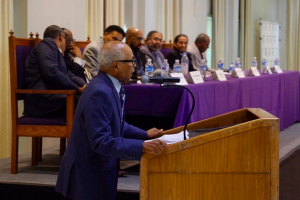
By Joe Farkus, NDG Contributing Writer
Seven Dallas-area ministers met with Sen. Royce West for a forum on the Black Church and Economic Development at Paul Quinn College Thursday, Nov. 9. The town hall meeting was well-attended by the community and special guests Dr. Zan Wesley Holmes Jr., Tracye McDaniel, and Dallas City Council member Tennell Atkins. The forum’s discussion centered around questions of economic justice, gentrification, and ways to innovate and encourage entrepreneurial opportunities in Dallas’ black community, specifically in the city’s southern sector.
“The black church has always been involved in economic development,” said Dr. Zan Wesley Holmes Jr., who once led the African American Pastor’s Coalition and was the long-time pastor of St. Luke A.M.E. “We’ve done it individually in our different churches; the challenge is: how can we do it together?”
A total of seven ministers were included on the panel, including Dr. Michael Bowie, Pastor of St. Luke “Community” UMC, Dr. Jerry Christian, Pastor of Kirkwood CME Church, Dr. Tony Evans, Pastor of Oak Cliff Bible Fellowship, Dr. Frederick D. Haynes III, Pastor of Friendship West Baptist Church, Rev. Lelious Johnson, Pastor of St. Paul Baptist Church, Dr. Ronald Jones, Pastor of New Hope Baptist Church, and Dr. Stephen Nash, Pastor of Mt. Tabor Baptist Church.
One of the most discussed topics during the panel discussion was the acquisition of property by black churches, both to help stem the tide of gentrification encroaching into South Dallas communities as well as to provide land where black businesses and business ventures can start and grow.
“The land that you own gives you the freedom to determine what you can do with it,” said Dr. Tony Evans. “We’ve accumulated some 150 acres to be able to have that independence.”
In addition to sheer land acquisition, Dr. Evans’s church has started their own credit union and provides opportunities for people to come and earn their G.E.D., get Microsoft certified, and get hired by Dallas companies looking for new employees.
“What we’ve attempted to do at Friendship West has everything to do with, on one level, fighting for economic justice,” Dr. Frederick D. Haynes III told the rest of the panel. “Dallas, like many cities across this country, is being hit by gentrification – especially on our side of town.”
“As churches, it is in our vested interest to understand our responsibility to get involved in public policy,” Haynes continued. “It’s good to develop…but your development can be sabotaged by economic injustice in the form of gentrification [or] pay-day predators having their way.”
Dr. Haynes’s church has gained notoriety for its West Wall Street event. The initiative provides an opportunity for black businesses to sell their products to church members between and after services on Sunday before Black Friday, allowing members the chance to get their holiday shopping done while supporting black businesses in the community.
There was also considerable talk amongst the ministers about churches being more selective in who they bank with, only banking with institutions that support the community and line up with the collective interests of black churches. Some even proposed the concept of a Dallas-based “black bank”.
“I believe we can grow financially, fiscally, and spiritually if we have a lending institution that we owned,” said Dr. Michael Bowie.
The idea gained considerable traction, with a member of the audience urging community leaders to create a black-owned bank during the question and answer portion of the evening.
“As the first and only black liquidator that closed Sunbelt Bank, I am pleading and asking – in the name of God, that we create a black bank now,” said the questioner. “Will the black bank be a part of the agenda?”
While much of the panel declined to indicate whether they would push for such an idea, there was much agreement on the need to coalesce around a common economic and community vision for the black community in South Dallas. The seven ministers present are expected to formulate a vision and plan to address the issues discussed the forum early next year.




